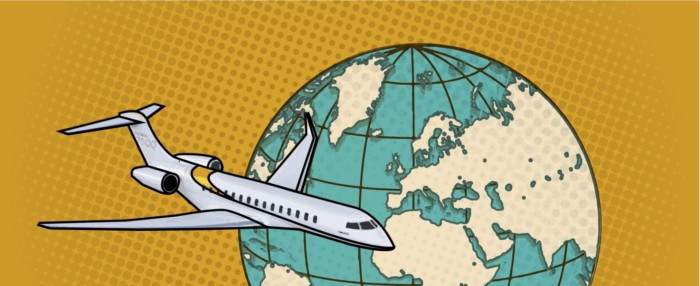
Nicolas Maduro’s main contractor was arrested last Friday, right after landing at the international airport of Cape Verde, an archipelago in the Atlantic, on the gates of Africa. It may be his penultimate trip, if he is finally deported or extradited to the United States, as U.S. authorities expect. It would be the worst of all endings after many years travelling and earning miles but, above all, millions of dollars thanks to opaque corporate structures, whereby he managed preferential currencies, public works, food supplies for the CLAPs, contracts with PDVSA, and even the trade of Venezuelan gold and coal since 2013.
|
Getting your Trinity Audio player ready...
|
It is a movielike aftermath ?as soon as he landed, international organizations that had him on their radar activated international alerts, until he was arrested. Alex Nain Saab Moran was arrested last Friday in the African island nation of Cape Verde. What started as a rumor became news and then an uproar that now threatens the highest political and financial power in Venezuela.
Alex Saab left the Maiquetia International Airport on Friday, at the stroke of noon, on private plane T7-JIS. The aircraft landed in Cape Verde at night, just minutes past 5 p.m. in Caracas. U.S. authorities ?actively following Alex Saab’s trail after including him on the Department of the Treasury’s sanctions list and accusing him of money laundering in mid-2019? issued a red alert and Interpol officials captured him.
It might be the penultimate trip of the Barranquilla-born man, who, within a few years, was the recipient ?along with his partner, Alvaro Pulido Vargas, also Colombian, whose name was German Rubio, until 2001? of millionaire contracts and businesses of different kinds, while the country was sinking into an endless collapse. Following the trail of the plane that took him to Cape Verde, for example, or other aircraft used in recent years by the Colombian duo, also entails the reconstruction of their business trail.
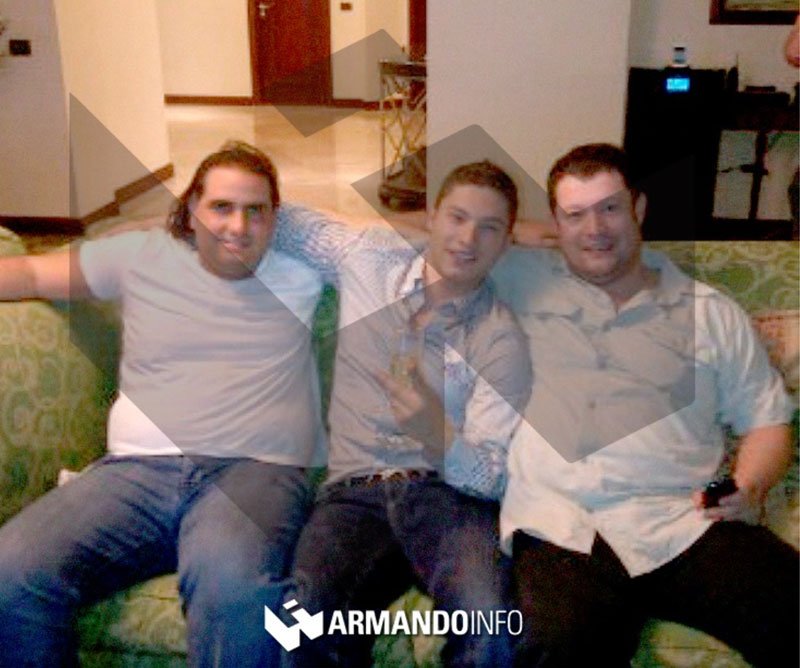
Bombardier Global 5000 T7-JIS ?a Canadian-made twin-engine plane, designed to serve the executive market, with a capacity of up to 16 passengers, depending on its arrangement? arrived on March 8 in Tehran, the capital of Iran, and two days later, it was back in Caracas, according to Armando.info with the help of Bellingcat, an electronic media company specializing in open source investigations and forensic journalism. Indeed, the air bridge between Venezuela and Iran speeded up in the last few weeks, while Maduro closed the purchase of Iranian fuel in exchange for Venezuelan gold, according to Bloomberg agency.
Moreover, sources familiar with the operation also confirmed the presence of Alex Saab in Iran shortly before the agreement was made.
Before that trip, Bombardier T7-JIS was on Colombian territory, certainly without Saab as a passenger, as the authorities have been looking for him there since late 2018. This week, which just ended, they froze assets valued at around ten million dollars, including an eight million dollar mansion in Barranquilla, his hometown.
Last February, the same plane, the T7-JIS, crossed from Maiquetia to Moscow, where Chavismo has found another financial point to evade U.S. sanctions. At that time, at least on the return trip from the Russian capital, there was also a stop in Cape Verde, where Alex Saab is now under arrest.
This is not the only aircraft that Alex Saab or his partner Alvaro Pulido Vargas used while hatching their business with Chavismo. If there is one thing they have done in recent years, it is to travel to where they created companies and made financial movements ?Antigua and Barbuda, Russia, Turkey and, more recently, African countries, such as Cape Verde itself.
Between 2017 and 2018, Alex Saab and Alvaro Pulido travelled in at least two other planes, N259FG and N456JA. Both aircraft landed at Mexican airports before the Attorney General’s Office of that country announced, in October 2018, an investigation against Group Grand Limited, the Hong Kong registered company whereby the Colombian tandem won at least two food supply contracts for about $800 million.
On May 11, 2017, for example, the aircraft with registration No. N456JA arrived at the Toluca International Airport in the state of Mexico. Alex Saab was on board together with Shadi Nain Saab Certain, one of the sons of the businessman who appeared in the registration papers of Group Grand Limited in Hong Kong, the company whereby they began supplying food for the Claps. Alvaro Pulido Vargas’ flights to that terminal and others in Mexico were frequent in 2017.
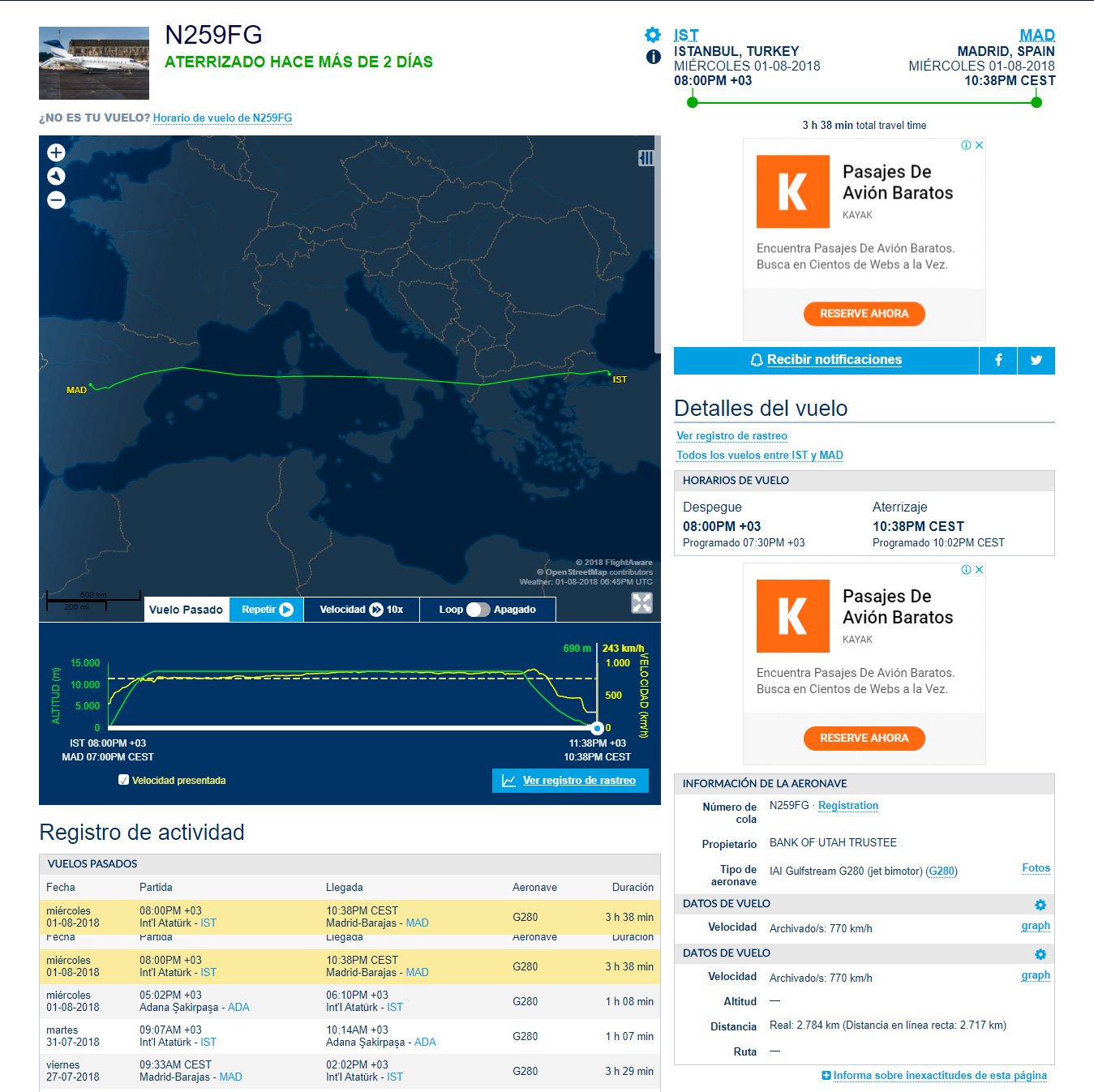
A year later, in 2018, aircraft N259FG flew several times to Turkey. That year, the Colombian businessmen began to use this country with companies registered there, like Mullberry Proje Yatirim, a as a supplier for the Claps’ food, while Nicolas Maduro was strengthening his political and commercial relationship with Turkish warlord Recep Tayip Erdogan. At this time, they also started to use companies registered in the United Arab Emirates, such as Asasi Food FZE, which also won contracts worth millions for the supply of Clap boxes or medicines.
The documents obtained by Armando.info confirm that between Group Grand Limited and Asasi Food FZE alone, the contracts awarded by the state-owned Corpovex from 2016 to 2018 amounted to $1.5 billion.
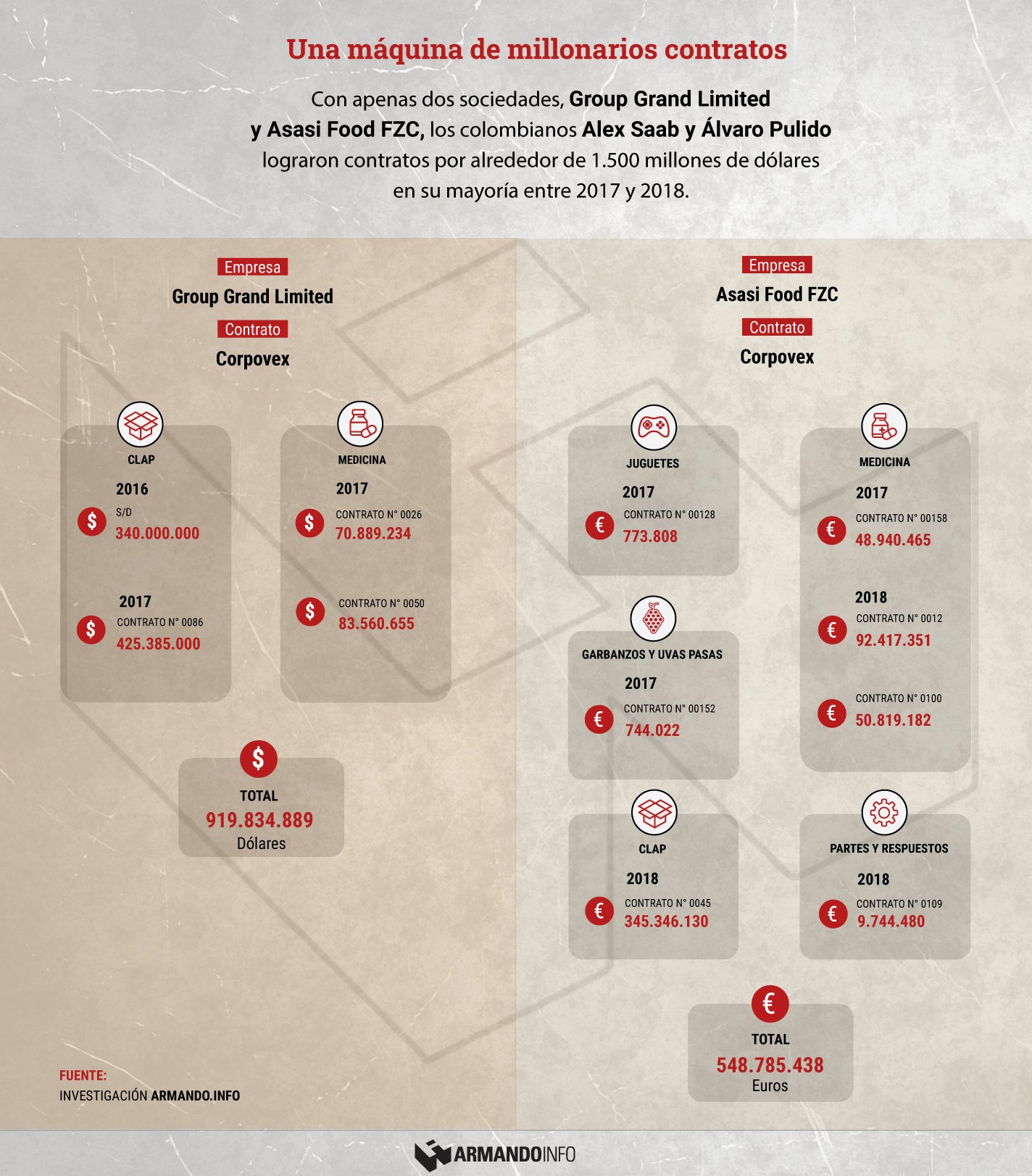
The N259FG aircraft was apparently used for entertainment as well. Based on the flight history compiled by this website, the aircraft, for example, was in Saint Petersburg and Moscow on July 10 and 11, 2018, respectively, coinciding with the dates of the World Cup semi-finals in Russia. The plane left the Russian capital to Madrid on July 16, the day after the final, and two days later, continued its flight to the joyful island of Mykonos in the Aegean Sea of Greece.
Punta Cana in the Dominican Republic or Paris in France were other destinations where the N259FG also made frequent stops in 2018. Even though Alex Saab’s close bond with Nicolas Maduro was already sounding strongly, the Department of the Treasury had not imposed sanctions. After that measure from Washington, the Colombian businessman was also the subject of other legal proceedings in Europe, such as the one announced by the Italian Guardia di Finanza in late 2019, which involved the freezing of assets valued at several million euros.
The arrest of Alex Saab raised such a dust that the Chavista regime, which avoided for years mentioning the Colombian man, issued on Saturday a statement in his defense, which is also revealing. In the text, released by Foreign Minister Jorge Arreaza less than 24 hours after Saab’s apprehension, he is described as a “Venezuelan citizen,” elevated to the status of “agent of the Bolivarian Government of Venezuela.”
Armando.Info could confirm that Alex Saab is the bearer of Venezuelan identity card No. 21.495.350, and also has a Tax Information Registry (RIF) in the Venezuelan tax agency. For years, Saab also had a sort of a diplomatic passport from Antigua and Barbuda, facilitated by the Prime Minister of that country, Gaston Browne - an ally of the Bolivarian revolution - as soon as he took office in 2014.
Antigua and Barbuda is indeed one of the jurisdictions that Alex Saab and Alvaro Pulido Vargas used to move funds from their businesses with Chavismo. A small bank on that island, managed by Venezuelans, received money from one of the Claps contracts, but they also moved millions of dollars from previous businesses to that tax haven, such as the construction of “vertical gyms” in 2014, awarded by the Propatria 2000 Foundation, when Walter Jacob Gavidia Flores and Carlos Malpica Flores, son and nephew of first lady Cilia Flores, respectively, were in charge of it.
This relationship with Flores’ sons - Walter, Yosser and Yoswal Gavidia Flores – in addition to Carlos Malpica Flores, was detailed in the press release issued by the U.S. Department of the Treasury in July 2019, as part of the arguments to justify the inclusion of Alex Saab on the OFAC list.
This condition as “government agent” may explain why Nicolas Maduro also pushed the state-owned PDVSA to sign a million-dollar contract in 2015 with Trenaco, Saab’s and Pulido’s shell company; why he handed over the former state-owned supply network “Abastos Bicentenario” for these Colombians to rename it Clap Stores; why he appointed Adrian Antonio Perdomo Mata, a former employee of Alex Saab and Alvaro Pulido Vargas, as president of the state-owned Minerven in 2018, let him put his hands, also in 2018, on the state-owned Carbones del Zulia; or why in January 2019, Saab was about to take control of Monomeros, a Pequiven subsidiary in his native Barranquilla, with the appointment by Maduro of Ronald Alexander Ramirez Mendoza, then cancelled by Colombian authorities.
This revealed “government agent” status may also justify that Alex Saab and his business had been the excuse to end up co-opting the then opposition deputies Luis Parra, Jose Brito, Adolfo Superlano or Conrado Perez, not only to try to launder Saab’s businesses in Europe in 2019, but to lead the January 5 assault on the National Assembly against Juan Guaido.
His arrest and the fear that he would be deported or extradited to the United States was what broke the silence held sway for years around the figure of Alex Saab. “Venezuela calls on the Cape Verdean State to release Alex Saab, facilitating his return and protecting his fundamental rights,” Arreaza required in a statement.
In the next few hours, it may be confirmed what Alex Saab’s destination will be and whether Cape Verde is the penultimate trip before he ends up in front of a judge in the United States. Thus, that would be the last trip of a journey that began in 2011, when he signed in the Miraflores palace, in front of Hugo Chavez, his first big deal with the Bolivarian revolution.
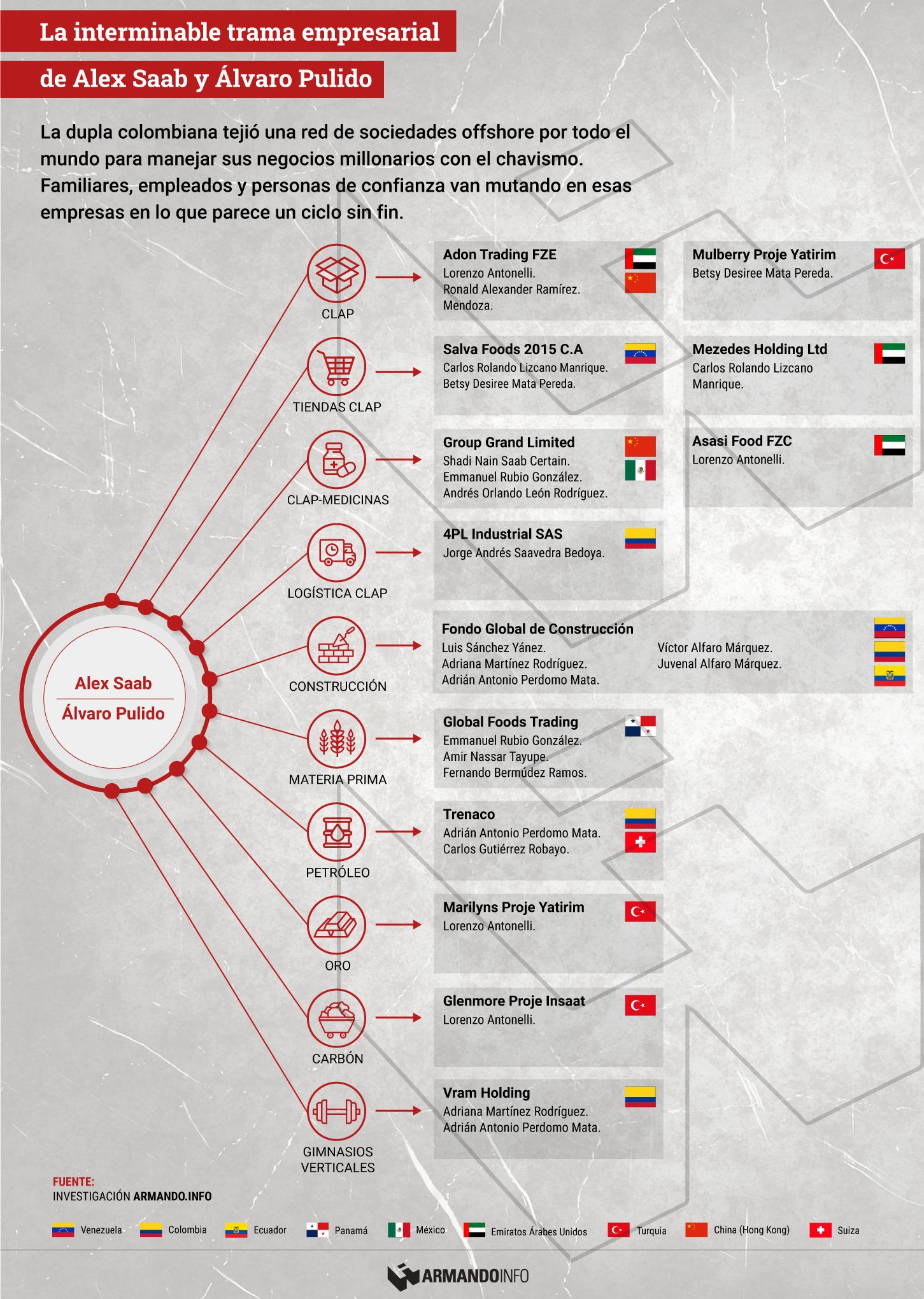
A small bank in Antigua and Barbuda, but controlled by Venezuelans, is at the center of some of the financial operations of Nicolas Maduro’s regime. Created in 2008 and with a diffuse trace for years, North International Bank began to take off in 2016 when it was authorized to operate in Caracas. Since then, it has been channeling millions of dollars to and from the coffers of the revolutionary ‘nomenklatura.’
An unknown company called Salva Foods 2015 —created months before Nicolás Maduro put out his idea of establishing a network of stores for the state program of the Local Supply and Production Committees (CLAP)—is the current beneficiary of that business. They are called CLAP Stores and are mistaken for a state-owned company, with food outlets where there were once the premises of Abastos Bicentenarios (state-owned supermarkets). Behind that operation, the shadow of Colombian entrepreneurs Alex Nain Saab Morán and Álvaro Pulido Vargas reappears, both linked since early 2017 to the CLAPs due to a dummy company registered in Hong Kong.
New documents show that the Hong Kong-registered company is one of Nicolás Maduro’s favorite to do business. While there are companies in the Venezuelan private sector that wait years for the payment of foreign currencies, in 2017, this company obtained at least two contracts for the supply of over 20 million of the boxes that the Government sells at subsidized prices, and it invoiced 113 million dollars to the Ministry of Food in just one day. The papers also confirm the connection of this company with Fondo Global de Construcción (Global Construction Fund), a network built by Colombian entrepreneurs Alex Nain Saab Morán and Álvaro Enrique Pulido Vargas, through which they obtained contracts under Hugo Chávez for the construction of prefabricated houses.
When Vice President Delcy Rodríguez turned to a group of Mexican friends and partners to lessen the new electricity emergency in Venezuela, she laid the foundation stone of a shortcut through which Chavismo and its commercial allies have dodged the sanctions imposed by Washington on PDVSA’s exports of crude oil. Since then, with Alex Saab, Joaquín Leal and Alessandro Bazzoni as key figures, the circuit has spread to some thirty countries to trade other Venezuelan commodities. This is part of the revelations of this joint investigative series between the newspaper El País and Armando.info, developed from a leak of thousands of documents.
Leaked documents on Libre Abordo and the rest of the shady network that Joaquín Leal managed from Mexico, with tentacles reaching 30 countries, ―aimed to trade PDVSA crude oil and other raw materials that the Caracas regime needed to place in international markets in spite of the sanctions― show that the businessman claimed to have the approval of the Mexican government and supplies from Segalmex, an official entity. Beyond this smoking gun, there is evidence that Leal had privileged access to the vice foreign minister for Latin America and the Caribbean, Maximiliano Reyes.
The business structure that Alex Saab had registered in Turkey—revealed in 2018 in an article by Armando.info—was merely a false start for his plans to export Venezuelan coal. Almost simultaneously, the Colombian merchant made contact with his Mexican counterpart, Joaquín Leal, to plot a network that would not only market crude oil from Venezuelan state oil company PDVSA, as part of a maneuver to bypass the sanctions imposed by Washington, but would also take charge of a scheme to export coal from the mines of Zulia, in western Venezuela. The dirty play allowed that thousands of tons, valued in millions of dollars, ended up in ports in Mexico and Central America.
As part of their business network based in Mexico, with one foot in Dubai, the two traders devised a way to replace the operation of the large international credit card franchises if they were to abandon the Venezuelan market because of Washington’s sanctions. The developed electronic payment system, “Paquete Alcance,” aimed to get hundreds of millions of dollars in remittances sent by expatriates and use them to finance purchases at CLAP stores.
Scions of different lineages of tycoons in Venezuela, Francisco D’Agostino and Eduardo Cisneros are non-blood relatives. They were also partners for a short time in Elemento Oil & Gas Ltd, a Malta-based company, over which the young Cisneros eventually took full ownership. Elemento was a protagonist in the secret network of Venezuelan crude oil marketing that Joaquín Leal activated from Mexico. However, when it came to imposing sanctions, Washington penalized D’Agostino only… Why?
Through a company registered in Mexico – Consorcio Panamericano de Exportación – with no known trajectory or experience, Joaquín Leal made a daring proposal to the Venezuelan Guyana Corporation to “reactivate” the aluminum industry, paralyzed after March 2019 blackout. The business proposed to pay the power supply of state-owned companies in exchange for payment-in-kind with the metal.